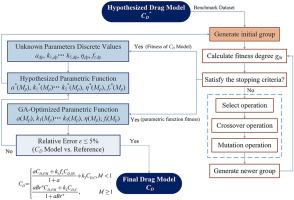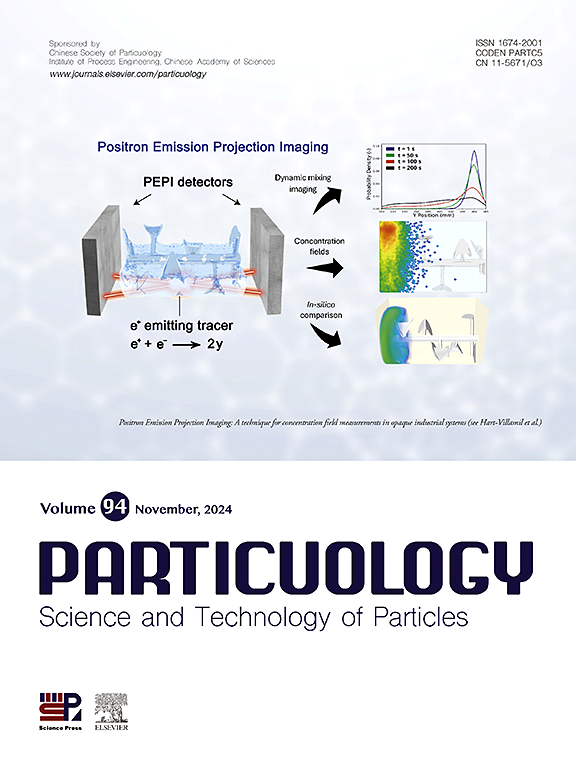A drag model containing compressibility, rarefaction and temperature ratio effects based on genetic algorithm fitting
IF 4.3
2区 材料科学
Q2 ENGINEERING, CHEMICAL
引用次数: 0
Abstract
This study presents a semi-empirical, comprehensive drag coefficient formulation for spherical particles moving in a gaseous medium. Leveraging a substantial body of experimental data, Direct Numerical Simulation (DNS), and Direct Simulation Monte Carlo (DSMC) results, the formulation incorporates compressibility, rarefaction, temperature ratio, shock wave physics, drag crisis and recovery effects. This comprehensive approach accurately models particle drag across a wide range of particle Mach and Reynolds numbers. Specifically, a genetic algorithm is employed to fit the formulation to the aforementioned data, resulting in a concrete expression. Compared to two latest universal drag models, the proposed formulation demonstrates a significantly lower relative error. Furthermore, three-dimensional numerical simulations using Ansys Fluent validate the accuracy of the developed model in applications, by contrasting its performance with the two state-of-the-art universal drag models.

基于遗传算法拟合的包含可压缩性、稀薄性和温度比效应的阻力模型
本文提出了球形颗粒在气体介质中运动的半经验的、综合的阻力系数公式。利用大量的实验数据、直接数值模拟(DNS)和直接模拟蒙特卡罗(DSMC)结果,该公式结合了可压缩性、稀薄性、温度比、冲击波物理、阻力危机和恢复效应。这种全面的方法准确地模拟了粒子在大范围内的马赫和雷诺数的阻力。具体而言,利用遗传算法将公式拟合到上述数据中,得到具体表达式。与两种最新的通用阻力模型相比,该公式的相对误差显著降低。此外,利用Ansys Fluent进行了三维数值模拟,通过对比两种最先进的通用阻力模型的性能,验证了所开发模型在应用中的准确性。
本文章由计算机程序翻译,如有差异,请以英文原文为准。
求助全文
约1分钟内获得全文
求助全文
来源期刊

Particuology
工程技术-材料科学:综合
CiteScore
6.70
自引率
2.90%
发文量
1730
审稿时长
32 days
期刊介绍:
The word ‘particuology’ was coined to parallel the discipline for the science and technology of particles.
Particuology is an interdisciplinary journal that publishes frontier research articles and critical reviews on the discovery, formulation and engineering of particulate materials, processes and systems. It especially welcomes contributions utilising advanced theoretical, modelling and measurement methods to enable the discovery and creation of new particulate materials, and the manufacturing of functional particulate-based products, such as sensors.
Papers are handled by Thematic Editors who oversee contributions from specific subject fields. These fields are classified into: Particle Synthesis and Modification; Particle Characterization and Measurement; Granular Systems and Bulk Solids Technology; Fluidization and Particle-Fluid Systems; Aerosols; and Applications of Particle Technology.
Key topics concerning the creation and processing of particulates include:
-Modelling and simulation of particle formation, collective behaviour of particles and systems for particle production over a broad spectrum of length scales
-Mining of experimental data for particle synthesis and surface properties to facilitate the creation of new materials and processes
-Particle design and preparation including controlled response and sensing functionalities in formation, delivery systems and biological systems, etc.
-Experimental and computational methods for visualization and analysis of particulate system.
These topics are broadly relevant to the production of materials, pharmaceuticals and food, and to the conversion of energy resources to fuels and protection of the environment.
 求助内容:
求助内容: 应助结果提醒方式:
应助结果提醒方式:


